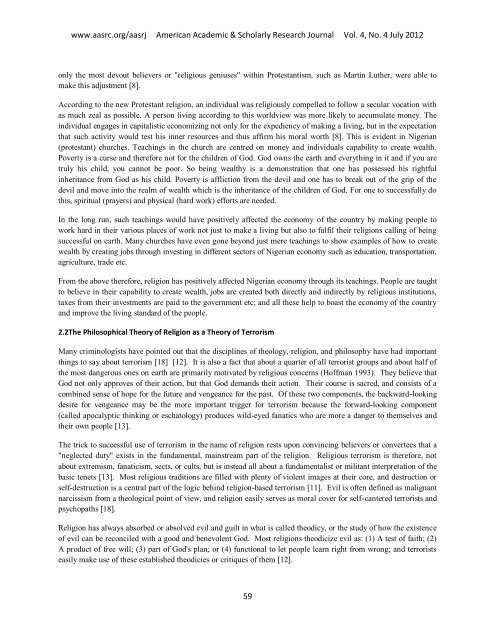E - American Academic & Scholarly Research Center
E - American Academic & Scholarly Research Center
E - American Academic & Scholarly Research Center
You also want an ePaper? Increase the reach of your titles
YUMPU automatically turns print PDFs into web optimized ePapers that Google loves.
www.aasrc.org/aasrj <strong>American</strong> <strong>Academic</strong> & <strong>Scholarly</strong> <strong>Research</strong> Journal Vol. 4, No. 4 July 2012<br />
only the most devout believers or "religious geniuses" within Protestantism, such as Martin Luther, were able to<br />
make this adjustment [8].<br />
According to the new Protestant religion, an individual was religiously compelled to follow a secular vocation with<br />
as much zeal as possible. A person living according to this worldview was more likely to accumulate money. The<br />
individual engages in capitalistic economizing not only for the expediency of making a living, but in the expectation<br />
that such activity would test his inner resources and thus affirm his moral worth [8]. This is evident in Nigerian<br />
(protestant) churches. Teachings in the church are centred on money and individuals capability to create wealth.<br />
Poverty is a curse and therefore not for the children of God. God owns the earth and everything in it and if you are<br />
truly his child, you cannot be poor. So being wealthy is a demonstration that one has possessed his rightful<br />
inheritance from God as his child. Poverty is affliction from the devil and one has to break out of the grip of the<br />
devil and move into the realm of wealth which is the inheritance of the children of God. For one to successfully do<br />
this, spiritual (prayers) and physical (hard work) efforts are needed.<br />
In the long run, such teachings would have positively affected the economy of the country by making people to<br />
work hard in their various places of work not just to make a living but also to fulfil their religions calling of being<br />
successful on earth. Many churches have even gone beyond just mere teachings to show examples of how to create<br />
wealth by creating jobs through investing in different sectors of Nigerian economy such as education, transportation,<br />
agriculture, trade etc.<br />
From the above therefore, religion has positively affected Nigerian economy through its teachings. People are taught<br />
to believe in their capability to create wealth, jobs are created both directly and indirectly by religious institutions,<br />
taxes from their investments are paid to the government etc; and all these help to boast the economy of the country<br />
and improve the living standard of the people.<br />
2.2The Philosophical Theory of Religion as a Theory of Terrorism<br />
Many criminologists have pointed out that the disciplines of theology, religion, and philosophy have had important<br />
things to say about terrorism [18] [12]. It is also a fact that about a quarter of all terrorist groups and about half of<br />
the most dangerous ones on earth are primarily motivated by religious concerns (Hoffman 1993). They believe that<br />
God not only approves of their action, but that God demands their action. Their course is sacred, and consists of a<br />
combined sense of hope for the future and vengeance for the past. Of these two components, the backward-looking<br />
desire for vengeance may be the more important trigger for terrorism because the forward-looking component<br />
(called apocalyptic thinking or eschatology) produces wild-eyed fanatics who are more a danger to themselves and<br />
their own people [13].<br />
The trick to successful use of terrorism in the name of religion rests upon convincing believers or convertees that a<br />
"neglected duty" exists in the fundamental, mainstream part of the religion. Religious terrorism is therefore, not<br />
about extremism, fanaticism, sects, or cults, but is instead all about a fundamentalist or militant interpretation of the<br />
basic tenets [13]. Most religious traditions are filled with plenty of violent images at their core, and destruction or<br />
self-destruction is a central part of the logic behind religion-based terrorism [11]. Evil is often defined as malignant<br />
narcissism from a theological point of view, and religion easily serves as moral cover for self-cantered terrorists and<br />
psychopaths [18].<br />
Religion has always absorbed or absolved evil and guilt in what is called theodicy, or the study of how the existence<br />
of evil can be reconciled with a good and benevolent God. Most religions theodicize evil as: (1) A test of faith; (2)<br />
A product of free will; (3) part of God's plan; or (4) functional to let people learn right from wrong; and terrorists<br />
easily make use of these established theodicies or critiques of them [12].<br />
59


